Following a Times Newspaper Inquiry, the recent announcement by the Department for Transport. Questions are being asked about the nearly £5 million, Tower Hamlets Council has given to external consultants, such as Sustrans over the controversial Liveable Streets programme.
Divided into six parts:
- May Day: Who took all the money?
- Announcement From Whitehall: Dodgy Data from Sustrans?
- Previously in Tower Hamlets Council: Dude, what happened to my complaint?
- Does the Rule of Law Apply in Tower Hamlets?
- Tower Hamlets Today: Watch out, Sustrans about?
- But Sustrans are the Goodfellas? Inclusivity or Daylight Robbery?
- Questions at the Town Hall: Starting with, can you teach an old dog new tricks?
May Day: Who took all the money?

On the 1st of May 2023, the Times Newspaper delivered a striking exposé, unveiling the disbursement of a princely sum amounting to £40 million from public coffers to Sustran, an organization dedicated to the propagation of cycling as a virtuous pursuit. Concurrently, a separate Freedom of Information Inquiry laid bare the revelation that Tower Hamlets Council, in a peculiar act of financial orchestration, had allocated a not insignificant £4.75 million to ‘external consultants’, a cohort that curiously included none other than Sustrans.
Undeterred in their quest for truth, the Times proceeded to divulge further details surrounding Sustrans’ efforts to sway local authorities. Ceaselessly beseeching them to implement the contentious Low Traffic Neighborhoods (LTNs), all the while, it appears, knowing about the misgivings pertaining to the viability and impartiality of such schemes in Tower Hamlets. In the context of Tower Hamlets, Liveable Streets.
In 2019, Sustrans made a submission to Tower Hamlets Council, exuding unwavering support for the Liveable Streets programme in Bethnal Green. Their impassioned words avowed that said proposals would usher in a transformative epoch of enhanced liveability and pristine air quality, an alluring prospect indeed. In essence, these schemes will reduce traffic.
Campaigners raised profound concerns regarding the motives of Sustrans, alleging that their vociferous lobbying efforts may serve a covert agenda aimed at bolstering their own fiscal prosperity. Enriching themselves at the expense of those whose daily lives rely upon the car, including individuals navigating the challenges of disability.
A spokeswoman for the group Social and Environmental Justice, which highlights the perceived “unfairness” of LTNs, said: “Our members have raised concerns about the cosy relationships between local councils and charities that are not only vocal supporters of LTNs but are being paid to deliver them. “There is something inherently wrong with a charity lobbying for a policy that results in the charity itself benefiting financially.”
It is, by all accounts, an enigma that warrants deeper scrutiny, as the moral fabric of this alliance between advocacy and monetary gain hangs precariously in the balance.
Announcement From Whitehall: Dodgy Data from Sustrans?

Following on from this revelation of the financial conflict of interests of Sustrans in Tower Hamlets.
On the 22nd of May, an article published by the Daily Mail bore the headline, “Is this the beginning of the end for Low-Traffic Neighbourhoods (LTNs)? Now Sadiq Khan concedes their imperfections and suggests removal of some in London – as the government admits there is no evidence of their mileage reduction.” Accompanied by a byline indicating that the London mayor acknowledges the potential need for “tweaking” or scrapping LTNs, the piece touched upon a noteworthy development.
Within the same article, the Daily Mail relayed the stance of spokespeople from the Department for Transport, who asserted that LTNs were not implemented with the specific intention of reducing traffic. Seeking substantiation for the claim that LTNs indeed curtailed distance driven, The Times requested evidence from the Department for Transport, only to be met with a lack of supporting material. When queried about the absence of research in this regard, an official responded, “LTNs aren’t primarily aimed at reducing mileage, and it is the responsibility of local councils to select the measures they deem necessary.”
Consequently, this situation raises an important query: Why are individuals within the Tower Hamlets Council advocating for these schemes despite having allocated nearly £5 million to “external consultants”? To address this question adequately, we must embark on a journey down memory lane.
Previously in Tower Hamlets Council: Dude, what happened to my complaint?

In January 2021, an outpouring of discontent swept through Tower Hamlets as over 2,500 residents affixed their names to a petition, decrying what they saw as discriminatory practices during the Liveable Streets consultations. The signatories, comprising a diverse array of individuals whose protected characteristics encompassed race, disability, and working-class socio-economic background, invoked the revered McPherson principles. Asking for an immediate halt to the scheme and demanding their grievances be treated as a racist incident of grave consequence.
In response to this persistent plea, the implementation of Liveable Streets initiatives came to an abrupt standstill, with one of the external contractors summarily removed by Tower Hamlets Council. Nevertheless, perplexing questions linger: Why did the Tower Hamlets Councillors and Tower Hamlets Council persist in engaging with the remaining “external consultants” implicated in the project? What motivations underpin their continued collaboration with these consultants?
Before we can embark upon unravelling this intricate web of inquiries, it is essential to delve into the multifaceted legal quandaries entangled within the realm of Liveable Streets.
Does the Rule of Law Apply in Tower Hamlets?

In the English law courts, a significant evolution has taken place in recent decades, wherein a common law duty to consult has been acknowledged as an integral facet of the overarching duty of fairness. This recognition, encapsulating the essence of a democratic society, was comprehensively addressed by the esteemed Supreme Court in the landmark case of R. (Moseley) v. London Borough of Haringey [2014] UKSC 56. The Court, adopting a broad and inclusive approach, ascertained that this duty endows reviewing courts with ample latitude to ascertain the requisites of “fairness” within a particular context.
Within the context of Tower Hamlets, the embodiment of fairness mandates a receptive environment that accommodates consultations and alternative options. Also taking into consideration the substantial population of residents hailing from migrant communities, as well as the prevalent issue of data poverty that afflicts the area. Additionally, the profound disparities in health outcomes necessitate a conscientious approach to public consultations and options.
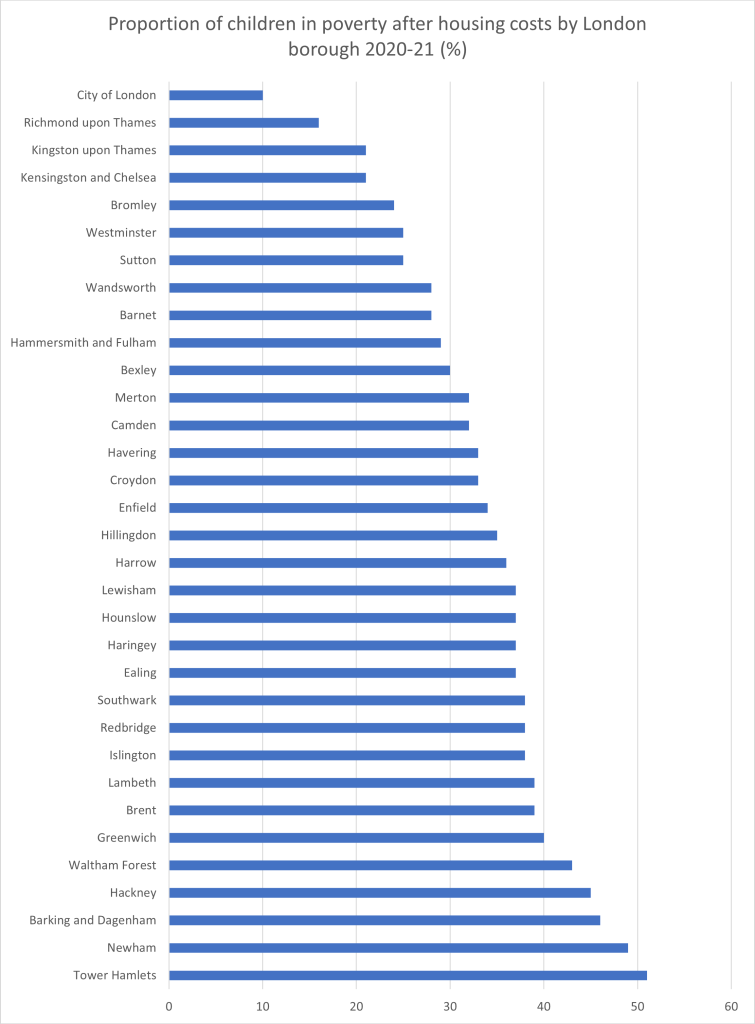
These concerns were raised by diligent residents during the full council meeting in January 2021, and subsequently reiterated by myself, serving as a Councillor representing Mile End, in March of the same year. It is therefore bewildering to observe that despite the suspension of these projects in response to the apprehensions voiced, the employment of external consultants persisted unabated. Indeed, the work continues unabated even today, prompting the pressing question: why was such work allowed to continue in the face of expressed concerns?
The duty of fairness, as expounded by the courts, should not be viewed as a mere formality, but as an unequivocal obligation that underpins the foundations of a just and participatory society. It is crucial that those entrusted with the responsibility of public decision-making exhibit a deep commitment to transparency, inclusivity, and responsiveness. The perplexing disjunction between the Council’s acknowledgement of concerns and the persistence of external consultations demands urgent scrutiny and an appropriate redressal.
The steadfast pursuit of fairness, as recognized by the judiciary, must be embraced with unwavering dedication if we are to uphold the principles of justice and ensure that the aspirations and needs of every resident are acknowledged and addressed.
But it seems this legal duty of fairness was ignored then, and it is being ignored even to this day.
Tower Hamlets Today: Watch out, Sustrans about?

I recently received a valuable tip-off from a neighbour in Whitechapel, who shared with me the receipt of a consultation letter from Sustrans. Intrigued by this development, I delved deeper, driven by a desire to understand the underlying motivations behind such a seemingly innocuous act. In light of the 2021 census data, which sheds light on the socio-economic landscape, and the distressing child poverty rates prevalent in Tower Hamlets, the need for inquiry became all the more pressing.
What could possibly be the rationale behind conducting consultations with residents, urging them to complete an online survey laden with cumbersome alpha-numeric passwords? The implications of this approach are deeply troubling, as it raises suspicions of a calculated endeavour to perpetuate discrimination against the working class and residents hailing from migrant communities. A preferred demographic is deliberately targeted to elicit the desired responses and shape the outcome in a predetermined manner.
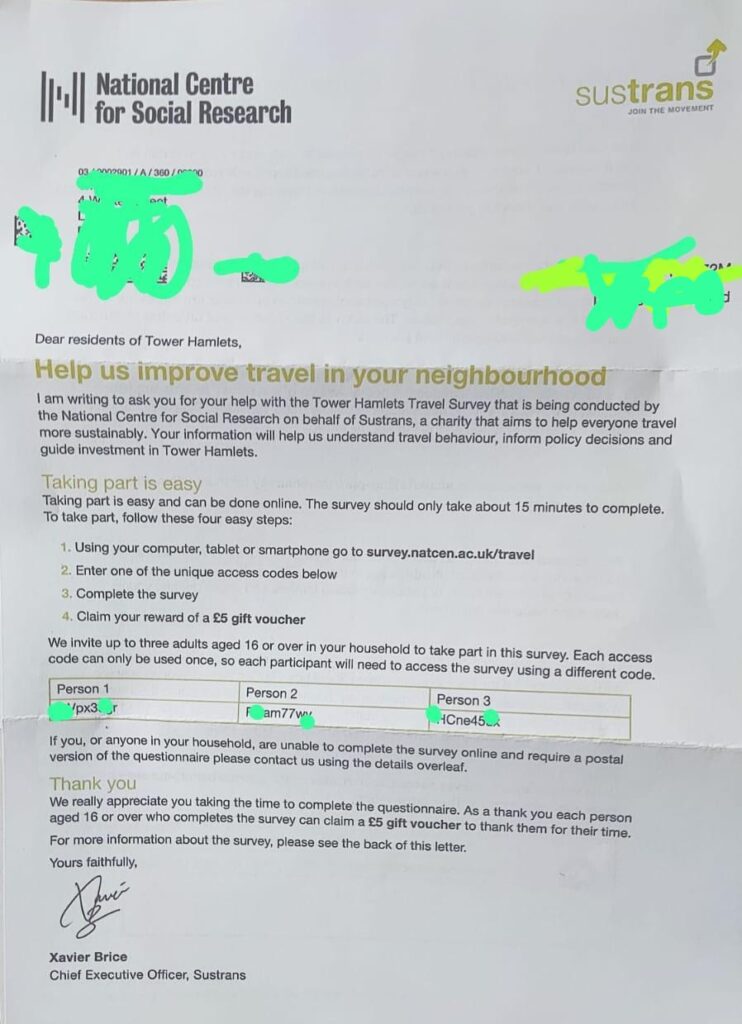
The accusation of deliberate indirect discrimination becomes acute, in light of the 2021 census data. Numerous residents from a migrant background, have high levels of poverty, in particular data poverty. Indirect discrimination, aggravated, due to issues raised by residents in the Town Hall at full council in January 2021.
This alarming discovery prompts a series of crucial questions that warrant addressing, particularly in relation to the current administration led by Mayor Lutfur Rahman in the esteemed Town Hall. The implications of these actions, if proven true, carry far-reaching consequences for the democratic process and the principles of fairness and inclusivity that underpin our society. As concerned citizens, we must urgently seek answers and demand accountability from those in positions of power.
But Sustrans are the Goodfellas? Inclusivity or Daylight Robbery?

In the realm of Sustrans and its purported inclusivity, one might encounter an argument wielded by its proponents: “But there was a letter in Bangla!” A feeble attempt, I must say. Let us delve into the matter with a discerning eye. Firstly, let us dispel the notion that the Tower Hamlets migrant community is solely comprised of those hailing from West Bengal or Bangladesh. If you doubt my assertion, I implore you to consult the illuminating census data of 2021. The tapestry of this borough boasts a multitude of migrant groups, each contributing to its diverse fabric.
Secondly, we must acknowledge a sociological truth: individuals possess varying degrees of social capital, intricately intertwined with their access to material resources. Contemplate, for a moment, the disheartening reality that more than half of our children are in the clutches of food poverty. In light of this dire circumstance, can we, in good conscience, assert that an online survey adorned with alphanumeric passwords is a suitable method of consultation for households grappling with these profound challenges? Should not Sustrans, as an organization, strive to make reasonable adjustments, a standard practice in employment laws and underscored in the Equality Act?
It behoves us to scrutinise the value for money provided by Sustrans, given the generous funding bestowed upon them, and their ‘friends’ by Tower Hamlets Council. One cannot help but question whether their actions, or lack thereof, represent a breach of contract with the Council. Are they, perchance, guilty of engaging in a deliberate and covert form of discrimination against residents possessing protected characteristics? These queries demand our attention, for they unveil a potential misalignment between Sustrans’ professed ethos of inclusion and their actual conduct.
In this era of purported egalitarianism, where lofty ideals are bandied about with ease, we must scrutinise the actions of organisations claiming to champion the cause of the marginalised. Sustrans, by their own volition, have placed themselves under the microscope. Will they withstand this rigorous examination or crumble beneath its weight? Why are councillors in Tower Hamlets promoting them? Only time will reveal the truth.
Questions at the Town Hall: Starting with, can you teach an old dog new tricks?

Is Tower Hamlets Council still working with Sustrans?
Given the now, alleged, dishonesty of Sustrans in Tower Hamlets, why is Tower Hamlets Council still working with them?
Applying the MacPherson Principles, why have not the behaviour of all the ‘external consultants’ on Liveable Streets not been investigated?
Given the previous allegation of racial discrimination, why have not all the ‘external consultants’, on Liveable Streets not been investigated? Given that work with PCL Consul was discontinued following the complaint at full council in January 2021.
#WhereIsThe£5million?
What is the breakdown of the £4.75 million given to external consultants? If the allegations of discrimination were valid (work with PCL consult discontinued by Tower Hamlets Council), why has the work not been discontinued by the other ‘external consultants’? Why has Tower Hamlets Council not reclaimed the monies paid, as a breach of contract?
Is there a wider systemic issue at Tower Hamlets Council?
These issues around consulting fairly and not investigating complaints have occurred before, in particular, complaints around the BAME Inequalities Report of 2021. Do we have a wider issue of culture at Tower Hamlets Council? Beyond that of the Labour administration, I was part of from 2018 to 2022.
“Insanity is doing the same thing over and over and expecting different results.”
Commonly attributed – Albert Einstein
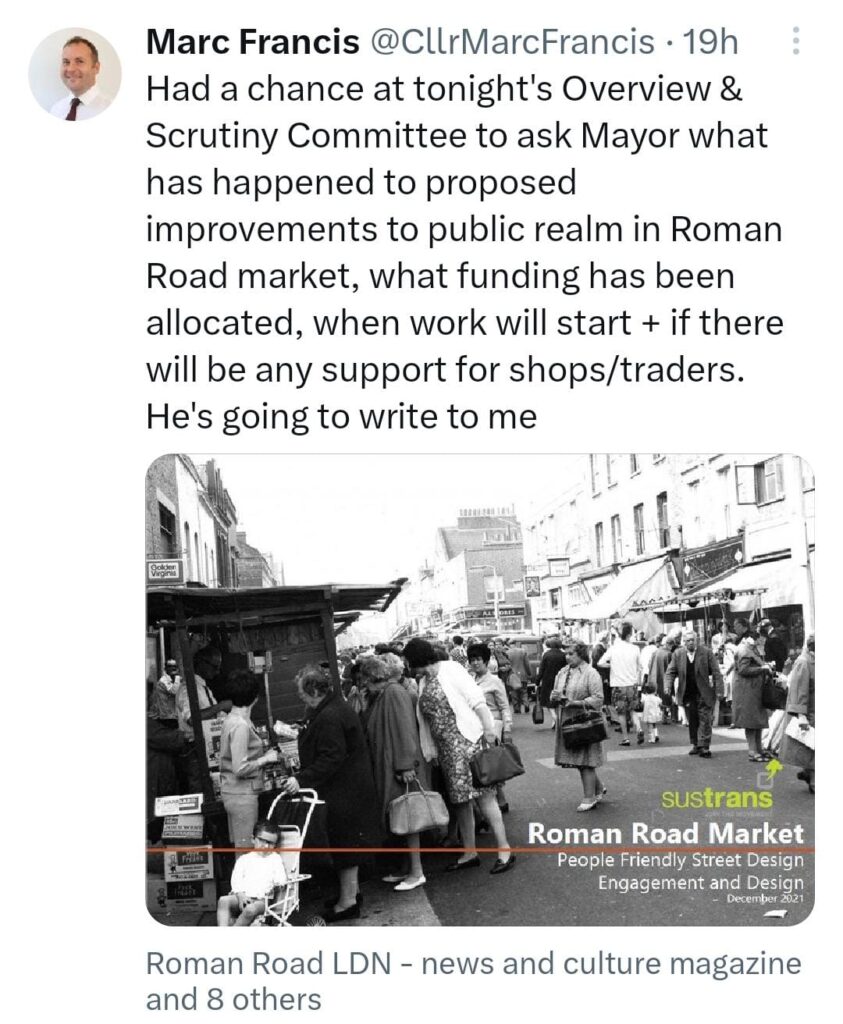
“In individuals, insanity is rare; but in groups, parties, nations and epochs, it is the rule.”
Friedrich Nietzsche


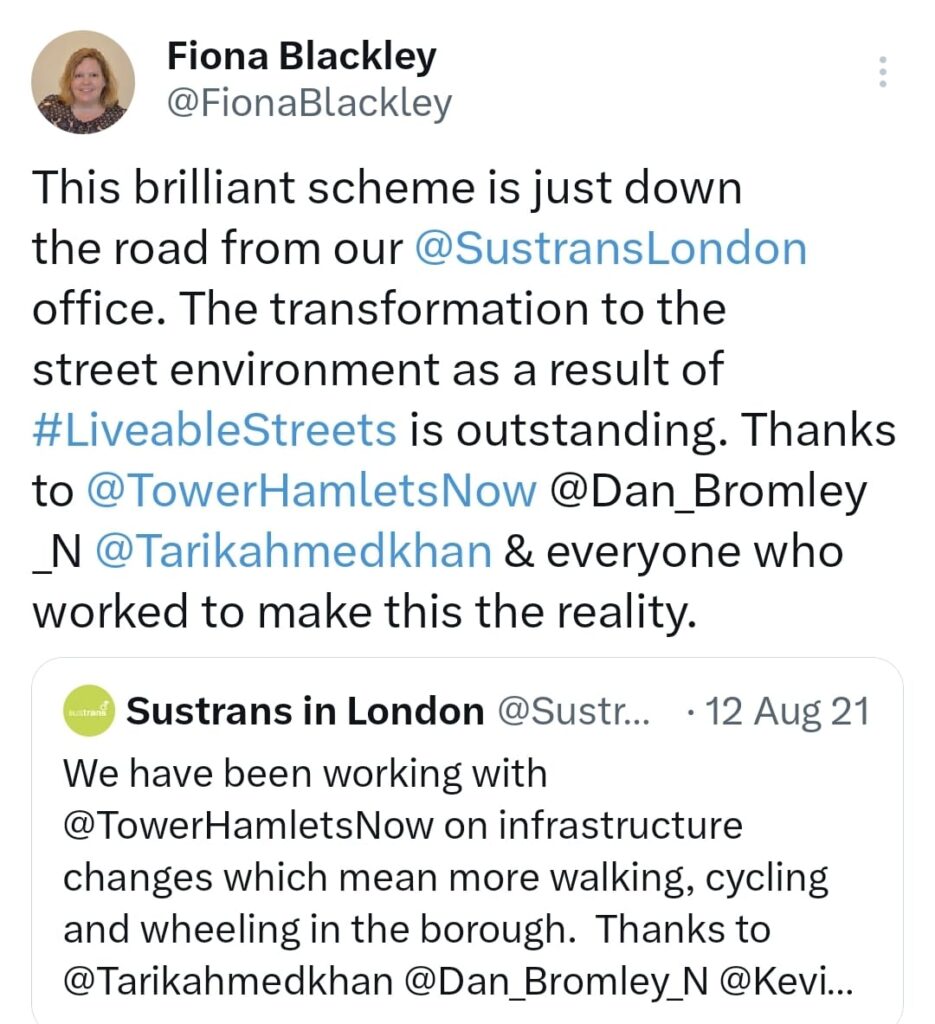
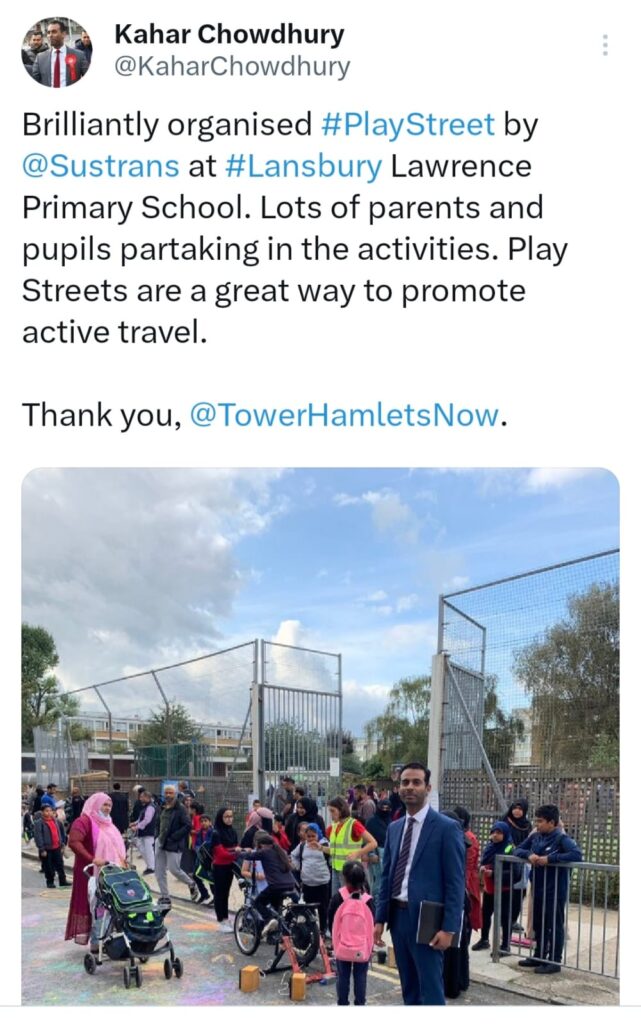
Recent Comments